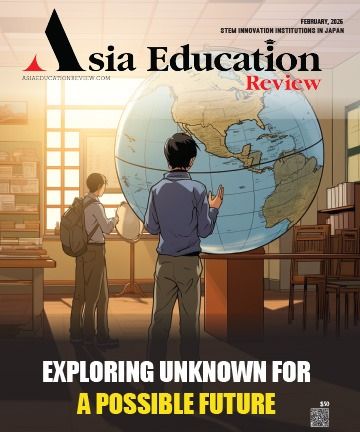Central Department Of Education: Advancing Teaching, Research, & Excellence in Nepal's Higher Education Landscape

Prof. Kabi Prasad Pokhrel
Head of Department
In Nepal, the higher education landscape plays a pivotal role in shaping the nation's future. As a developing country, Nepal recognizes the importance of higher education in driving socio-economic growth and development. Access to quality higher education ensures a skilled workforce, fosters innovation and promotes sustainable development. It serves as a catalyst for social mobility, empowering individuals from diverse backgrounds to contribute meaningfully to society and achieve their full potential.
The Central Department of Education, established in 1956, following the Nepal National Educational Planning Commission's recommendations (1954-65), is a premier institution under Tribhuvan University (TU). Initially focused on training primary and secondary school teachers, it evolved into the Institute of Education (IOE) in 1971 and later became the Faculty of Education (FOE) in 1982 under the umbrella of Tribhuvan University. Amid Nepal's shifting political landscape, the department remains a cornerstone of higher education, with over 64 constituent and 1,200 affiliated colleges of TU, enrolling more than 90 percent of the country's higher education students.
The institution aims for excellence through three core areas: digitalizing learning processes, updating curricula to meet current professional needs, and fostering career development. This holistic approach aims to elevate the quality of education in Nepal, ensuring it meets the demands of today's professional landscape.
The Central Department of Education, particularly under the Department of Science and Environment Education, offers comprehensive programs that integrate practical and field knowledge. Among its 17 departments, this one provides semester-based Master's courses in Chemistry Education, including a four-semester M.Ed. program and a one-year B.Ed. for science graduates.
The curriculum covers diverse subjects like organic, inorganic, physical, and environmental chemistry, along with modern science teaching and research methods. Equipped with advanced laboratories, the department emphasizes practical application to meet national educational needs. Additionally, it offers a postgraduate diploma in science education, ensuring a robust blend of theoretical and hands-on learning experiences.
“The increasing popularity of Environmental Sciences courses stems from their critical role in community development and addressing climate-related challenges. Our higher education must transfer knowledge to society, addressing community issues and needs. Environmental geography and sciences are vital in South Asia, where natural disasters cause severe damage annually.
Our integrated approach to teaching and research, including citizen science, ensures that community-specific knowledge and technology help mitigate these impacts. This interdisciplinary education equips communities with innovative solutions to combat climate change and other social challenges”, emphasizes Prof. Kabi Prasad Pokhrel, Head of Department.
Kabi Prasad Pokhrel is a seasoned professor of environmental geography, who earned his Ph.D. from Banaras Hindu University. With 30 years of experience in academia, he has excelled in teaching, research, and administration. His expertise has significantly contributed to the field, influencing students and shaping scholarly discourse.
Leading the Way in Science & Environment Education
The Central Department of Education, particularly the Department of Science and Environment Education, boasts state-of-the-art facilities designed to enhance student learning and career readiness. With a focus on digitalization and practical application, students benefit from well-equipped science labs and specialized resources. Notably, the institution was recognized by the government for its innovative approach to sustainable education through school gardens.
Additionally, noncredit courses offer opportunities for skill development and career advancement post-graduation. Supported by a faculty of 120 teachers, the department prioritizes research engagement, encouraging both faculty and students to address community issues through academic analysis and practical solutions, thus fostering a culture of hands-on learning and sustainable education.
The Central Department of Education fosters extensive collaborative partnerships with national and international institutions, leveraging its expertise in teacher training programs, curriculum development, and educational planning. With longstanding collaborations with the Nepal government, including initiatives like the Norway project and partnerships with Korean universities, the department continues to expand its global outreach. Academic events such as workshops, seminars, and training sessions serve as platforms for knowledge sharing and collaboration among faculty, students, and staff.
Additionally, the department publishes three journals regularly, while national and international seminars facilitate academic discourse. To enhance employability, the institution collaborates closely with government departments like Education, aligning its curriculum with national requirements to ensure student readiness for the job market.
Entrepreneurship education is also emphasized across faculties, empowering students to apply their academic knowledge practically. The department facilitates internships and placement opportunities, enabling students to gain real-world experience and transition seamlessly into their careers. Through these multifaceted initiatives, the institution remains committed to fostering academic excellence, professional development, and societal impact.
The institution aims for excellence through three core areas: digitalizing learning processes, updating curricula to meet current professional needs, & fostering career development
Looking ahead, the institute anticipates substantial progress from the Department of Science and Environment Education in the near future. Focused on tackling modern challenges, the department aims to refine curricula and faculty training to meet community needs effectively. Applied research endeavors will offer practical solutions and essential skills to the wider community.
Through collaborations with the university, governmental bodies, and related departments, the institute will ensure the provision of comprehensive knowledge and techniques to address evolving societal requirements.
“Drawing from my experience and aspirations, it's evident that the higher education landscape in many South Asian nations, Nepal included, requires a transformation towards greater productivity, ingenuity, and innovation. Enhancing the quality and accessibility of higher education is paramount, necessitating improvements in infrastructure, management, and curriculum relevance.
Today's competitive environment demands a student-centric approach, fostering applicability and utility. Additionally, higher education must address global challenges collaboratively, conducting innovative research to provide noble solutions and benefit communities as a whole”, concludes Prof. Kabi Prasad Pokhrel.
🍪 Do you like Cookies?
We use cookies to ensure you get the best experience on our website. Read more...





